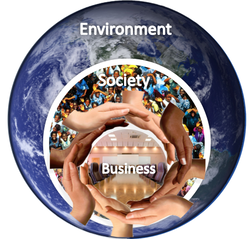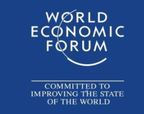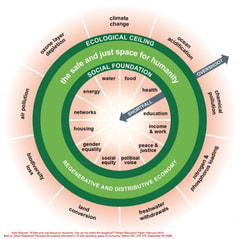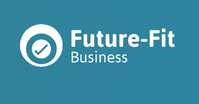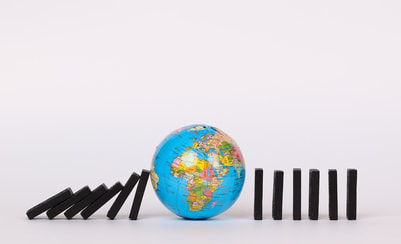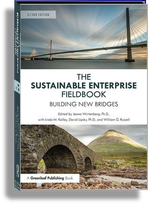GLOBAL LEVEL
How can "Everyone" align visions, goals, initiatives to be in the new future for "ALL" ? “The world is a complex, interconnected, finite, ecological - social - psychological - economic system. We treat it as if it were not, as if it were divisible, separable, simple, and infinite. Our persistent, intractable global problems arise directly from this mismatch.” Donella Meadows

On a global level our livelihoods are intertwined, everywhere. We are inescapably interconnected. While we live and work locally, the work we do depends on work done by people who are somewhere else in the world. Critical materials and components for most things we use and make are sourced from far away. Take any product you use everyday — your car, your clothes, your phone, your furniture, the food you eat. Where did it come from? Where did all the resources that went into it come from? What about the people, all the people involved in producing it and getting it to you, where are they? Most of your stuff of everyday life, the small and large stuff you count on was not entirely locally produced and maybe none of it was at all. Furthermore, at the end of their useful life what remains of the things you have used will be turned to trash far away from where much of it originated.
This is globalization in the 21st Century. At this point we need to ask ourselves whether we can sustain this way of living. What if it isn’t sustainable? What do we have to do to ensure that Earth’s support systems on which we depend will endure and that humanity can thrive sustainably?
This is globalization in the 21st Century. At this point we need to ask ourselves whether we can sustain this way of living. What if it isn’t sustainable? What do we have to do to ensure that Earth’s support systems on which we depend will endure and that humanity can thrive sustainably?
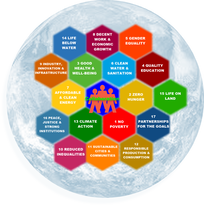
Success requires that we take a systems approach to global development and human sustainability. Otherwise it’s likely that practices and policies that progress one goal will fail to support other goals or worse have unintentional negative impacts on them. The Sustainable Development Goals show this well.
Sustainable Development Goals (SDGs)
While each of the 17 SDGs has a particular focus, these goals are interrelated and interdependent. Because of that fact significant progress on one goal depends on how far along progress is on other goals. For instance, #1 No Poverty depends to a great degree on #8 Decent Work and Economic Growth which in turn depends on #4 Quality Education and #3 Good Health and Well-Being. People cannot do this alone. It takes individuals, communities, businesses, and industries working in collaboration to achieve these goals.
Sustainable Development Goals (SDGs)
While each of the 17 SDGs has a particular focus, these goals are interrelated and interdependent. Because of that fact significant progress on one goal depends on how far along progress is on other goals. For instance, #1 No Poverty depends to a great degree on #8 Decent Work and Economic Growth which in turn depends on #4 Quality Education and #3 Good Health and Well-Being. People cannot do this alone. It takes individuals, communities, businesses, and industries working in collaboration to achieve these goals.
The Critical Importance of Systems Thinking and Mental Models to Achieving the Sustainable Development Goals
|
|
|
Pandemic-Resistant Economies.....On March 31, Andy Revkin hosted a webinar with Herman Daly and Kate Raworth on Pandemic-Resistant Economies as part of his “Sustain What” Webcast series. The conversation explored ways of rethinking how human progress should be pursued and measured. Andy Revkin is the Director of the Initiative on Communication & Sustainability at The Earth Institute at Colombia University. Herman E. Daly, a founding force behind “steady-state economics,” will examine possible paths to less fragile global systems with Kate Raworth, whose “doughnut economics” model aims to build economic policies and metrics that put thriving ahead of growing. |
|
Parley Ocean Plastic ......adidas is a founding member of Parley for the Oceans, a global network of creators, thinkers and leaders from brands, governments and environmental groups who come together to raise awareness for the beauty and fragility of the oceans and collaborate on projects that can end their destruction....
|
|
Virtual Worlds Best Practices in Education is a global grass-roots community event focusing on education in immersive virtual environments. Virtual Worlds Best Practices in Education is a meaningful way for presenters to share their research and experience about the rich learning systems in virtual worlds and games.
|
|
Future-Fit Business Transforming business to thrive in 21st Century. Our free tools guide companies and investors to create value for themselves and society, now and in the future. The Future-Fit Business Benchmark offers a holistic framing for companies to consider all their social and environmental impacts.Translating 30+ years of research into practical and free tools that guide real progress toward a flourishing future. A wide range of businesses, from start-ups to global corporations and investors, are using the Future-Fit Business Benchmark to chart a path to success in an ever-more volatile, uncertain, complex and ambiguous world.
|
|
Pandemic Pivots - Insights From Asia....Asian countries were among the first to be impacted by COVID-19 and have delivered some of the most effective healthcare responses. Businesses have adapted to the challenges quickly too and Asian economies appear to be rebounding rapidly.
This episode of ESGX Live will explore: 1. Where and how have Asian countries been most impacted by COVID-19 and what opportunities has this created? 2. How are commercial and philanthropic organisations responding? Where are the opportunities and what are the risks? 3. What are the longer-term implications for the world’s economic center of gravity? How should companies, investors and philanthropists respond? |
